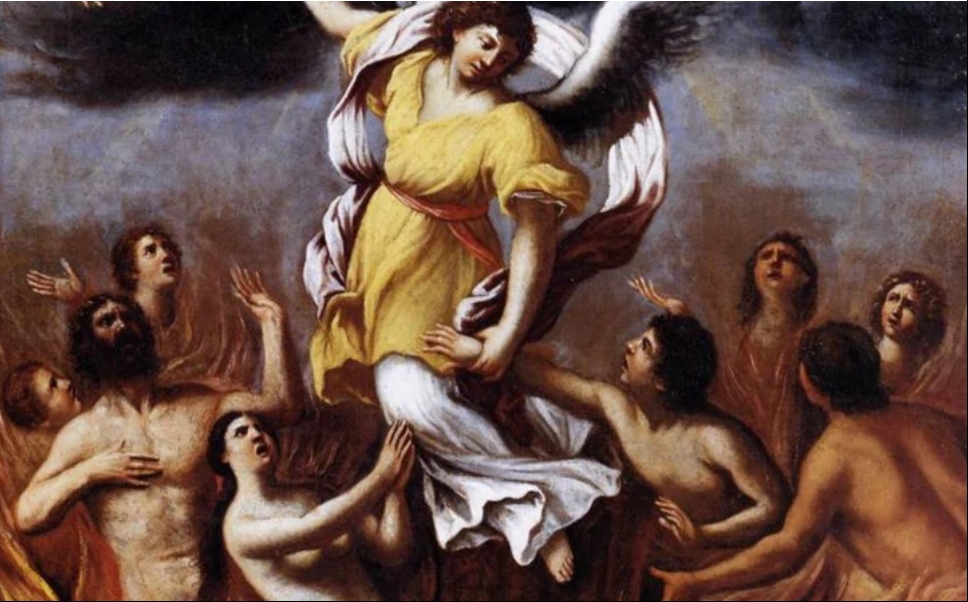“What Happens When a Government Tries to Chain the Conscience?”

Fr. George Rutler was kind enough to share his latest parish bulletin concerning the recent HHS mandate with the Cardinal Newman Society.
He writes:
Our many fellow Catholics now enchained for the Faith of our Fathers in such places as China, Syria, and Egypt are, as Father Faber’s hymn says, “in heart and conscience free.” But what happens when a government tries to chain the conscience itself?
A few weeks ago, in a remarkably unanimous decision, the U.S. Supreme Court rejected the attempt of the present Administration in Hosanna-Tabor Evangelical Lutheran Church and School v. EEOC to restrict religious freedom. Chief Justice Roberts wrote that the Administration’s argument that the First Amendment does not guarantee the right of religious organization to choose its leaders, was an “extreme” infringement of the free exercise clause.
Undeterred, and menacingly on the cusp of the anniversary of Roe v. Wade, the Department of Health and Human Services has issued an “interim final rule” which requires all private health plans, including those of Catholic hospitals and schools, to include coverage of prescription contraceptives, female sterilization procedures, and abortion counseling.
For a while, various Catholic leaders had hoped that they might reach an understanding with the Administration, and some even felt more at peace with the president’s assurances. But “peace for our time” only lasts until Poland is invaded. Cardinal Mahony, whom no one would fault for intransigence, now says, “I cannot imagine a more direct and frontal attack on the freedom of conscience than this ruling today. This decision must be fought against with all the energies the Catholic Community can muster.” Our own archbishop said, “In effect, the president is saying we have a year to figure out how to violate our consciences.”
At the time of the last presidential election, some may have thought that I overstated things in finding parallels with the dystopian world described in Robert Hugh Benson’s Lord of the World, in which Julian Felsenburgh makes eugenics “a sacred duty.”
Since our Lord did not humiliate the frightened apostles by saying “I told you so” when he rose from the dead, I shall not say “I told you so” to any who underestimated the plottings of social engineers whose audacity is only an audacity of despair.
Blessed John Henry Newman, in Discussions and Arguments on Various Subjects, cited the prediction of an eighteenth-century Protestant bishop and scientist, Samuel Horsley:
“The Church of God on earth will be greatly reduced, as we may well imagine, in its apparent numbers, in the times of Antichrist, by the open desertion of the powers of the world. This desertion will begin in a professed indifference to any particular form of Christianity, under the pretense of universal toleration; which toleration will proceed from no true spirit of charity and forbearance, but from a design to undermine Christianity, by multiplying and encouraging sectaries… For governments will pretend an indifference to all, and will give a protection in preference to none.”
Aldous Huxley: The Mike Wallace Interview- 5/18/58
Aldous Huxley, social critic and author of Brave New World, talks to Wallace about threats to freedom in the United States, overpopulation, bureaucracy, propaganda, drugs, advertising, and television.
WALLACE: This is Aldous Huxley, a man haunted by a vision of hell on earth. A searing social critic, Mr. Huxley 27 years ago, wrote Brave New World, a novel that predicted that some day the entire world would live under a frightful dictatorship. Today Mr. Huxley says that his fictional world of horror is probably just around the corner for all of us. We’ll find out why, in a moment.
WALLACE: Good evening, I’m Mike Wallace. Tonight’s guest, Aldous Huxley, is a man of letters, as disturbing as he is distinguished. Born in England, now a resident of California, Mr. Huxley has written some of the most electric novels and social criticism of this century.
He’s just finished a series of essays called “Enemies of Freedom,” in which he outlines and defines some of the threats to our freedom in the United States; and Mr. Huxley, right of the bat, let me ask you this: as you see it, who and what are the enemies of freedom here in the United States?
HUXLEY: Well, I don’t think you can say who in the United States, I don’t think there are any sinister persons deliberately trying to rob people of their freedom, but I do think, first of all, that there are a number of impersonal forces which are pushing in the direction of less and less freedom, and I also think that there are a number of technological devices which anybody who wishes to use can use to accelerate this process of going away from freedom, of imposing control…
Full video: http://www.hrc.utexas.edu/multimedia/video/2008/wallace/huxley_aldous.html
Brave New World: Liberation from the “Dis-benefits” of Motherhood

In remarks that critics have said are disturbingly reminiscent of Aldous Huxley’s famous dystopian novel “Brave New World,” a UK ethicist has argued that since pregnancy causes “natural inequality” between the sexes, women must be liberated from the “burdens and risks of pregnancy” through the use of “ectogenesis”, or artificial wombs.
“Pregnancy is a condition that causes pain and suffering, and that affects only women. The fact that men do not have to go through pregnancy to have a genetically related child, whereas women do, is a natural inequality,” writes Dr. Anna Smajdor in an article that recently appeared in the Cambridge Quarterly of Healthcare Ethics.
In her Defense of Ectogenesis, published online December, 2011, Smajdor construes pregnancy as a “medical problem, along with other conditions that cause pain and suffering.” Smajdor is Lecturer in Ethics at the School of Medicine, Health Policy and Practice in the University of East Anglia.
“If there were a disease that caused symptoms and risks similar to those caused by pregnancy, I contend that it would be regarded as being fairly serious, and that we would have good reasons to try to insure against it,” argues Smajdor, who lumps pregnancy along with “diseases” that continue for many months, such as the measles.
For Smajdor, currently “men reap all the benefits of women’s gestation, while women bear the risks and burdens.”
Accordingly, in Smajdor’s worldview, “women are disadvantaged as a group through brute luck, because men can reproduce without undergoing the risks of pregnancy.”
In other words, to be a woman, for Smajdor, simply means to become biologically more like a man. To do this, a woman’s innate and natural potential to procreate, nurture, and bear a new human life must be stripped away and handed over to science and technology. Only when all human beings do not bear children will a genuine equality be more closely approached, she proposes.
“Perhaps not all the dis-benefits of being a woman are attributable to childbearing,” acknowledges Smajdor, “but alleviating these burdens would surely help.”
In Huxley’s “Brave New World” reproduction is taken over entirely by the World State where children are created, “decanted” and raised in “hatcheries” and “conditioning centres.”
For Smajdor, the issue is simply a matter of sex equality: “Either we view women as baby carriers who must subjugate their other interests to the well-being of their children or we acknowledge that our social values and level of medical expertise are no longer compatible with ‘natural’ reproduction,” she concludes.
The Judgement of the Next Generation

Roe v. Wade
How will future generations judge us on abortion?
Just two days after the inauguration, another crowd filled Washington’s streets: pro-lifers who gather each year for the March for Life. January 22 marked the 36th anniversary of Roe v. Wade, and, after so many years with little change or improvement in abortion law, the nation has grown a bit blasé about this annual demonstration. We still say abortion is a hot issue—but it’s not as hot as it used to be. The abortion controversy used to command cover space on magazines, while TV networks hosted hour-long debates. You don’t see that any more.
Maybe people just got tired of hearing about it. Year after year, the two sides said mostly the same thing—and nothing much changed. Eventually, public attention was bound to sidle off to some new, more exciting topic (gay marriage, anyone?). When attention drifted, it was the pro-choice side that had command of the status quo.
And you could say that settles that; from now on there will be less and less talk about abortion, and we’ll just get used to things the way they are.
But I can imagine things going a different way. Not soon—maybe not till the baby boomers have passed from the scene—but it’s possible that a younger generation will see abortion differently. With abortions now running around 1.2 million per year, the total number of abortions since Roe v. Wade is about 49 million. That’s a big number—about a sixth of the U.S. population. It’s an especially big number if you’re not absolutely sure that it’s not a real loss of human life.
After all, if you see a little girl hit by a car, you’re going to yell, “Get an ambulance!” not “Get a shovel!” It’s in the very fabric of humanity to be on the side of life if there’s the faintest hope that life exists. We don’t throw children away when we’re not sure whether they’re alive or not. And, as the pro-choice side never stops saying, it’s not that they’re positive a fetus is not alive—it’s that they’re not sure. As the cliché goes, “Nobody knows when life begins.”
When I was a young, fire-breathing college feminist in the early 1970s, we didn’t see abortion as a melancholy private decision—it was an act of liberation. By choosing abortion, a woman could show that she was the only person in charge of her life and bowed to no one else’s control. But this formulation soured as the grief felt by post-abortion women began to accumulate. The flip side of autonomy is loneliness, and, for many women, their abortion decision was linked to emotional abandonment.
And then there was the advent of ultrasound technology, enabling us to see live images of the baby moving in the womb. In 1989, word went round the pro-life movement to order the tape of pollster Harrison Hickman’s presentation at that year’s NARAL convention. On it he said, “Nothing has been as damaging to our cause as the advances in technology which have allowed pictures of the developing fetus, because people now talk about that fetus in much different terms than they did 15 years ago. They talk about it as a human being, which is not something that I have an easy answer how to cure.”
So there are some reasons to think that the abortion question has not been settled, but has merely gone underground. That might be a necessary step. It has to go away so that it can be rediscovered and seen in a fresh light.
I don’t expect that reconsideration soon: My boomer generation will never see abortion as anything other than the wise and benevolent gift we bestowed on all future generations. We still control the media, the universities, and so forth, and it will take time for all of us to topple off the end of the conveyor belt.
But the time is coming when a younger generation will be in charge, and they may well see abortion differently. They could see it not as “a woman’s choice” but as a form of state-sanctioned violence inflicted on their generation. It was their brothers and sisters who died; anyone under the age of 36 could have been aborted, and somewhere around a fourth or a fifth of all babies are. A younger generation might feel a strange kinship with the brothers and sisters, classmates and coworkers, who are missing.
And I’m afraid that if they do see things that way, they aren’t going to go easy on my generation. Our acceptance of abortion is not going to look like an understandable goof. The next generation can fairly say, “It’s not like they didn’t know.” They’ll say, “After all, they had sonograms.”
Even in my generation, people who think of themselves as defenders of the weak and the oppressed may occasionally have a quiet moment when they wonder, “How, on this one issue, did I wind up on the side that’s defending death?” There’s a lot of ambivalence out there, and a lot of unspoken grief too, I think. Our pro-choice generation may have won the day—but sooner or later, that day will end. No generation can rule from the grave. When that time comes, another generation will sit in judgment on ours. And they may judge us to be monsters.
http://www.frederica.com/writings/the-judgement-of-the-next-generation.html













































